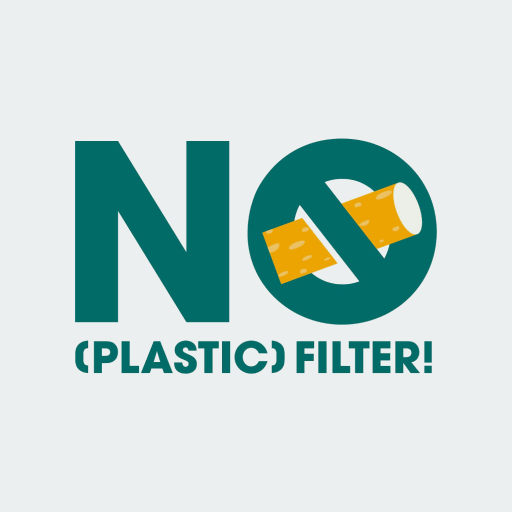We're a coalition advocating for the introduction of ecotoxicity warnings on cigarette packs, to put an end on inappropriate littering.
Cigarette butts are the main polluters of the oceans. Their main highly toxic waste. Their main plastic waste. They pollute ecosystems and cause serious damages to biodiversity. Yet they are almost never considered in water governance policy conversations.

The European Commission's Directorate-General for Fisheries and Maritime Affairs (DG MARE) has selected the "Filter the Future" coalition from a pool of candidate projects across Europe for its contribution to improving the health of the world's oceans and the well-being of coastal communities.
FTF is a highlight partner of the EU campaign #MakeEUBlue: Cities In Action!

Cigarette butts are the main polluters of the oceans 🌊
Cigarette butts are the main highly toxic waste in the environment.
They condense more than 2,500 toxic substances such as arsenic, mercury, ammonia, heavy metals, lead and nicotine (a pesticide!). Most of them are water-soluble and ecotoxic: they easily spread in water and cause serious damage to biodiversity, oceans, fresh water, soil, forests and cities.

50,000-120,000 cigarette butts are improperly littered around the world every second.
Cigarette butts affect the growth, behaviour and reproductive capacity of many organisms such as crustaceans and micro-algae (the basis of the ocean food chain). Research reveals that a cigarette butt soaked in a litre of water kills half of the fish exposed to it.
A nasty habit of littering
It is now more accepted and common to throw a cigarette butt in the street than a tissue or a piece of paper. The environmental impact of cigarettes remains little known and rarely discussed. People who are convinced that cigarette butts are biodegradable and harmless for the environment are the most likely to do so.

It's time to talk about the environmental impact of cigarettes.
Studies suggest reducing cigarette butts littering by informational tools and campaigns. Messages about biodiversity, cleanliness and well-being have more impact than legal sanctions.

We demand changes in the
European Tobacco Products Directive
In the next few months, the European Tobacco Products Directive 2014/40/EU (TPD) will be revised (for the first time in 10 years). This text regulates cigarette and roll-your-own tobacco packaging. We are calling the European Union to take bold action by incorporating our following recommendations:
Add ecotoxicity warnings on cigarette/roll-your-own packs
These messages must be displayed alongside health warnings and cover a minimum of 10-20% of packs. They shouldn’t imply guilt or stigmatise: they should raise awareness on the environental impact of cigarette.
We recommend that each EU Member States also print these messages on cigarettes, following the example of the new Canadian legislation.
Plan a phase-out of plastic and non-plastic filters – and ban misleading messages about biodegradable filters.
The current revision of the Tobacco Product Directive 2014/40/EU should be in line with the EU Directive on Single-Use Plastics (2019/904) aiming to reduce plastic pollution.
Biodegradable filters (plastic-free filters) are not the solution: they are not safe for the environment, since cigarette butts toxic substances also spread through ecosystems. Studies have shown that filters are ineffective in preventing health problems.
Make tobacco manufacturers pay for the costs of removing and cleaning up cigarette butts.
Cleaning up and removing cigarette butts costs yearly millions of euros for local authorities.
The Extended Producer Responsibility (EPR) of the tobacco industry must be engaged: they should contribute to the costs of cleaning and environmental remediation.
Frequently Voiced Doubts
Not all smokers stopped after the introduction of health warnings on packs in 2014, true. But many did, and more people are expressing a desire to quit their addiction to nicotine to protect their health.
Our demands won't put an end to all littered cigarette butts in European waters, soils, forests, and cities. But it is a crucial starting point to raise global awareness and step up the fight against the toxicity of the 140,000 cigarette butts littered worldwide every second.
PS: Did you know that undermining the effectiveness of health warnings is one of the formidable strategies deployed by the tobacco industry?
Indeed it would. But that's not achievable right now. What is feasible is to reduce pollution from improperly discarded cigarette butts thanks to the current revision of the European Tobacco Products Directive (2014/40/EU).
We might also ask for red-coloured filters to raise awareness of their toxicity. Or create compartments in packs for disposing of cigarette butts. Or even call for rubbish bins on every street corner! There are dozens of ideas that would definitely be worth examining, but let's start with a small, achievable victory.
The process of revising a European directive takes time. It takes even more time when tobacco lobbyists are delaying the introduction of new legislation. Firstly, the European Commission drafts proposals for amendments. They are presented to the European Parliament and Council for approval. If there are any disagreements, proposals may go back and forth between institutions.
As a coalition, we need to be mobilised throughout the process: the more we speak out and join the coalition, the more likely it is that our demands will be accepted. It may take a few years, but the collective success will be even greater!
Cigarette filters were originally created to prevent tobacco from sticking to teeth. Once the link between cancer and tobacco was established, the tobacco industry used filters as a supposed health solution. Today, they are presented as a way to protect smokers' health, but studies show that this is a marketing lie. They do not really protect smokers and may even aggravate certain cancers by encouraging smokers to inhale more deeply and intensely.
In addition, filters are made of plastic and release thousands of chemicals into the water. They therefore increase the environmental impact of the tobacco industry.
Behind the coalition
The coalition was formed following a gathering of European citizens who took the initiative, on their own names behalf, to join forces to carry out this common advocacy. We are driven by our personal conviction to serve the common good.
In accordance with Article 5.3 of the WHO Framework Convention on Tobacco Control, members acknowledge that they have no current or past direct or indirect links with the tobacco industry, the vaping industry, and/or tobacconists.


















